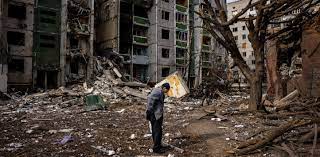As always the hardest in Mykolaiv. Sleep is near insolvable in a Ukrainian megacity that has been under nearly constant bombing by Russian hail since the launch of the war in February.
Your mind is either racing- frantically trying to work out how close the rearmost explosion was, whether it was a bullet or a rocket, a one-off or part of a bombardment- or wondering how long it might be before the windows jolt again and the screaming bowwow of the air raid temptress sounds.
But if callers like me, on my third trip to the megacity since the war began, find the long nights challenging, how do original people who reckon they’ve had just 20 or so quiet nights since the war began- conceivably manage?
” Sleep? Not much,” said the director of our hostel one morning last week. She had sounded irrepressibly energetic in March, contending past the boarded- up windows to show guests the new lemon sanctum in the basement.
But now her face betrayed the prostration that appears to be inviting the importance of Mykolaiv.
” I do not have my own basement at home. It’s swamped. So, we have nowhere to hide. We just lie there in the dark. Last night the explosions were the closest yet- a couple of blocks down,” she said.
Once ordinary noises, like a slammed door, or a growling truck, are now loaded with terror, as people brace themselves, artificially, subconsciously, and permanently, to reply to anything that might sound like a bullet, or a aeroplane .
” Me? I have been trying to go to bed beforehand. Around 7 or 8 pm. That way you get a many hours before the thunderclaps begin, if you are lucky,” said Gela Chavchavadze, 60, the proprietor of a café that delivers free cooked refections, utmost mornings, to neighbourhoods bombed the night ahead.
The explosions generally start soon after night. Artillery fire from Russian positions to the south, rockets from behind the frontlines further east, spurt- launched losers, and ruinous voyage dumdums allowed to be launched from vessels in the Black Sea and beyond.
Occasionally there is a specific target, but- whether by accident or design- the blasts substantially do in domestic neighbourhoods and with a blitz- suchlike randomness that turns every night into a whim-whams- shredding mind- game.
Over the once week the Russian hail- including several day- time attacks has reached a new position of ferocity.
” It’s a big megacity,” said Mykolaiv military spokesperson Capt Dmitro Pletenchuk, by way of offering some ideational statistical comfort to visiting intelligencers standing near the remains of the megacity’s executive headquarters. But he prompted us to wear body armour at all times and texted me later to confirm that 130 civilians had been killed and 589 wounded by Russian dumdums since February.
Broad shards of glass from the remains of his kitchen table two hours after cluster losers exploded on the road outdoors, dentist Alexander Yakovenko, 58, wondered why he was still alive.
” I can not explain it. I should not be( alive) then. The temptress goes off every night. But, for some reason, last night I decided to move down from my bedroom and into the other side of the apartment,” he said, pointing at the shrapnel marks on the wall that would surely have killed him.
A neighbour, Olga, who had come round to help clear up, began to cry.
” What do I say to my grandson? He woke up one night, crying, and said to me-‘ Granny, I want to live’,” she said, before returning to reach more glass off the bottom.
Seeking comfort or meaning amid similar destruction, some people in Mykolaiv are leaning on their religion.
” It’s each in God’s hands. What will be will be,” said 67- time-old Svetlana Kharlanova, standing on the doorstep of her near- miraculously complete cabin, nursing a small shrapnel crack in her head, four hours after a bullet left a deep crater in her yard.
Others are seeking solace in a commodity that was originally banned in Mykolaiv for the first months of the war.
” I see plenty of people drinking now- indeed early in the morning. I do not suppose they should have lifted the alcohol ban. It’s not applicable during wartime,” said café proprietor Gela Chavhavadze.













